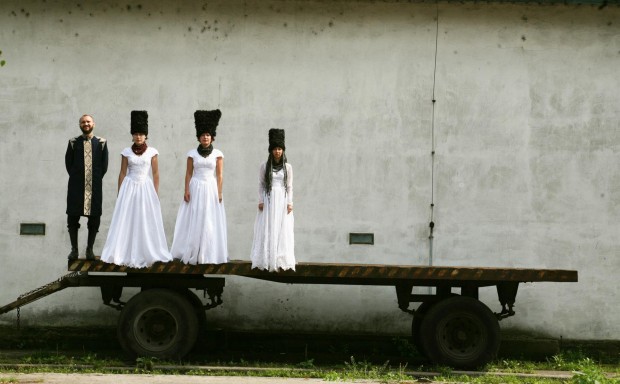In 2014, the Russian Federation sent troops into Ukraine and annexed the strategically significant Crimean peninsula. As was the case with the Russo-Georgian crisis of 2008, the fracas temporarily caught the attention of the American mainstream media, before fading from view. DakhaBrakha, an experimental folk band from the Ukraine wants to ensure that the U.S. continues to pay attention to the former Soviet republic.
“A lot of people know nothing about Ukraine.” says Marko Halanevych, speaking through a translator—DakhaBrakha’s manager, Gorban Iryna. “Maybe just because of geography class they know the name of our country. But, we want to be the beginning of interest in Ukraine.”
Halanevych aims to accomplish this through music—specifically the genre-defying music he creates along with backing singers and multi-instrumentalists Nina Harenetska, Olena Tsybulska, and Iryna Kovalenko.
“We want to mix Ukrainian music with everything. We give new life to old folklore,” Halanevych says. “Maybe its not purely authentic, but we try to make it understandable for modern people, for young people.”
DakhaBrakha has almost infinite range. “Karpatskly Rap” opens with the twangs of a yawing mouth harp. Next, a tinkly piano tip-toes, and a muted drum plods.
Then, Harenetska absolutely bodies the track with Ukrainian rap verses, while laying down a swaying cello groove.
“We like breaking the rules. We can do blues, we can do hip-hop, we can do pop” Halanevych says. “We just do the music we feel. We’re just playing. We can do whatever.”
Sometimes, they seek to create an entire new world. On “Vesna” yips, rustles and chirps transport the listener to a tranquil wetlands before panting accordions and galloping drums take over.
“(Adding these noises) is not special for us. It’s something natural.” Halanevych says. “We want to create something for people to feel, not only music, but (atmospherically).”
Other times, the finished product is similar to a radio hit if you listen closely. On “Specially For You,” Halanevych’s soulful falsetto falls somewhere between James Blunt and James Blake, then drops into a punkish growl. The result sounds like Tom Waits crossed with A Hawk and a Hacksaw. On “Baby” he warbles through soulful, pleading chorus, then blows a shimmering harmonica solo.
Each airy number starts humbly. Chords are left to linger, and notes drift off. Melodies and strange mantras intersect, sniffing at each other before uniting in sudden, swirling harmony.
“Each song has its own way of creating itself,” Halanevych says. “Sometimes we can hear one sound and it can start the whole song. Sometimes we have one melody or one instrument, and try to develop it, and bring some Ukrainian folk to it. We want to show the Ukrainian features to the world.”
It is spectacular to hear, but even more moving to watch.
“DakhaBrakha was specially created for the theatre performance.” he says. “For us, it’s hard to imagine music without the theatre. Theatre helps us create and share this common reality with the audience. It’s for us also. We want to feel something together.”
Since their thespian origins, the band has traveled around the world, often playing for audiences that aren’t fluent in Ukrainian, such as the crowd at Bonnaroo in 2014.
“We think music is the universal language.” Halanevych says. “People can feel our energy, our emotions. They see we are there for them. They see we really like what we do, and want to share it. That’s why its not really a big problem that people can’t understand the lyrics.”
And, Americans aren’t the only ones.
“Sometimes, even Ukranians can’t understand the meaning,” he says. “We use some songs from pre-Christian times—songs that were rituals. And, people feel it. It is so old and unfamiliar, that it’s almost new.”
But, DakhaBrakha wants to break out of the old mold of folk music. They seek to innovate and bring order to their wide-ranging influences.
“Pop music, its the same everywhere. Same in U.S. Same in Ukraine,” Halanevych says. “But, folk music makes you feel something specific and unique to different tribes and different people. We like to listen to the best examples of music from everywhere. So, we have all these styles inside of us when we produce our own music.”
The resulting music is infectious—both welcoming and utterly foreign.
“For our next album, we think it would be great to do some folk blues,” he says. “But, if we get inspired to create something different from this, it’s not a problem because it’s all art, it’s all creative. The main thing for us is to settle the Ukrainian voice in all genres.”
DakhaBrakha are playing Bing Concert Hall at Stanford on Apr 15 at 7:30pm. More info.



